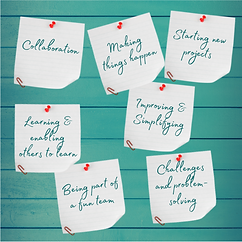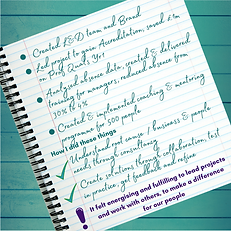How to change your career in your 50s when you don't know what you want to do
You’ve had a good career but it doesn’t light you up any more. Something’s missing. You’d love to do something that feels more aligned with who you are now. But what? And how? If this sounds familiar, read on ...


First, know that you’re not alone. Many people I talk with feel like this.
I felt like this myself. I'd gone from being ambitious and always looking for new things to do, new ways to use my strengths to make a difference - to knowing that I just couldn’t face any more corporate BS and needed to do something 'more me'. More aligned with my strengths and values.
So here’s what I did after taking redundancy in my 50s. It worked for me and doing similar has worked for many of my clients.
You're in your 50s and something needs to change. You've had a good career but it no longer satisfies you (maybe it's exhausted you).
Things have changed. You've changed! You're not ready to 'early retire' and want to do something you enjoy, that aligns with who you are and what matters to you, now.
You've got ideas, you know you've got options. How do you figure out which is right for you?
Identify what you really enjoy doing at work - and in life
Write down all the things you enjoy doing at work. Anything that makes your day go faster and gives you a sense of satisfaction and achievement.
I didn’t go deep into this initially, I just dumped a load of words onto a piece of paper. Things like:
Problem-solving / Collaboration / Making things happen / Starting new things / Improving processes / Being part of a fun team / Enabling people to learn / Learning new things and putting them into practice.


Think about the things you know you do really well. When other people tell you you’re clever, or you’ve done something fantastic. When you know you’ve achieved your goals and more. When you know you’ve made a difference.
My notes were something like this:
I’m really great at: Helping people learn / Explaining complex topics in a simple way / Analysing information to make good decisions / Having ideas that improve the way we do things / Getting things done / Leading and developing a team / Starting new projects / Influencing people / Building relationships.
Identify your biggest achievements, how you did them and how you felt about them
If you’re struggling to think of your achievements, ask other people. Often we impress people without realising, and they notice and remember things that we don’t.
Once you’ve identified your biggest achievements, thinking about HOW you did them gives you additional insight into what you’re great at.
And then thinking about how you felt about your achievements gives you insight into whether you’d want to do them again.


💡 Just because you're good at something, doesn't mean you want to do it again. We can all learn skills because we have to, and we've all spent days groaning about what we have to do (anything in Excel for me!).
So think about the energy and enjoyment you gained from your achievements. If you feel good when you do something, keep it in your list. If it drains you of energy remove it. Life is too short to do something you don't want to, if you don't have to!
Identify what matters to you at work
This one is about Hertzberg’s Motivation to Work (motivation-hygiene) theory.
Motivators are those things that give us positive, intrinsic satisfaction. They usually include things like recognition, achievement, autonomy, personal growth, creativity, etc plus benefits and culture that enable us to work in alignment with our values and what matters to us.
Hygiene factors are the things that don’t lead to prolonged higher motivation, though if they’re missing will cause dissatisfaction. They’re extrinsic to the work itself, and include things like your working environment, being micromanaged, commuting, company policies and salary.
Identify what matters to you outside of work
Think about what you really enjoy, what gives you a sense of meaning and purpose now.
Do you have hobbies that you wish could be your job?
Do you volunteer for something that’s close to your heart?
Do you have family and friends that you'd love to spend more time with?
Maybe you already have a 'side hustle' that you'd love to develop - if you had the confidence? (See my blog: Is fear getting in your way?)
What's on your bucket list that you've never had time for?
Have you spent years dreaming about retraining for something different?
My blog: What really matters to you can help you with this.
What does success mean to you now, and what if it were guaranteed?
Imagine you bring all of the above together. You can do work that you enjoy. You can have time for what really matters to you. You can earn what you need to or want to. You can use your strengths. You can hit your intrinsic motivators while avoiding the hygiene factors.
What are you doing?
What does that feel like for you?
Thinking like this can open up your ideas, bringing to the surface things you’d love to do but have always suppressed because you don’t believe it can happen.
Bringing it all together
Look back through all your notes and ask yourself these questions:
What themes are coming through, repeated in most if not all of the sections?
What skills and strengths have you identified that you want to use in your work?
What are the things that are ‘must haves’ for this change?
What are the ‘definitely don’t want’ things for this change?
Use your answers to create an ‘Ideal job guide' so you can stay on track with what you're looking for in your career change.
What if I'm still not clear?
Be curious!
Talk with people who love what they do. What do they love about their work? How did they get into it? What skills and strengths do they use?
Browse job boards. What appeals to you? If anything causes a bit of excitement – or even interest – take note of what causes it. Then think about how you can explore this more.
Are there people in your existing network who do things you’re interested in? Arrange to talk with them to find out more.
What can you try out? Maybe on a voluntary basis, or part-time.
How else can you learn more about something that interests you? Maybe a course, or join a networking group?
There are so many different jobs and types of work. What will really light you up may not yet have come onto your radar.
By trying out some different things you can build a fully informed idea of what you really love doing.
Take note of what you enjoy and what you don't want to do.


And if you'd like some more help...
My Explore coaching is designed with people like you in mind. We'll explore your unique strengths profile and your values to gain clarity about the type of work you want to do, and the type of organisation that will be the best fit for you, and then create a plan to make it happen!
Hi, I'm Karen!
Having made my own career change in my 50s after escaping corporate, I now help others do the same.




